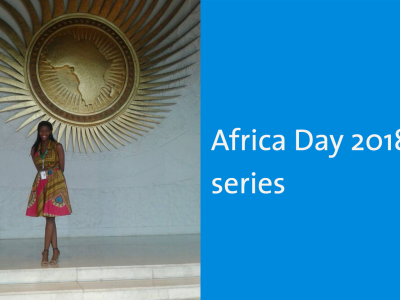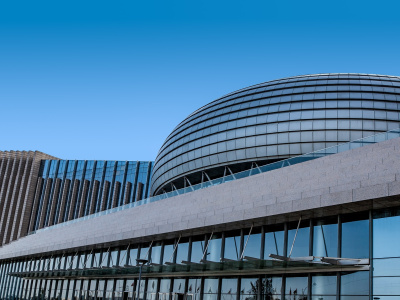
What being African means to me
Ahead of Africa Day (25 May), in the first of a three-part blog series, Lidet Tadesse explains what being African means to her.
I have owned up to and nurtured my African identity over the years, and have always considered myself to be pan-African. Growing up in Addis Ababa, I used to go up to the park in front of the UNECA building in Addis Ababa, to read the names of the African leaders who planted trees there in the early 60s. I am not new to the commotion that looms over the city ahead of African Union summits.
Being Ethiopian, I understood, from an early age, the significance of the victory of the Battle of Adwa, where Ethiopian forces defeated Italian colonial powers in the late 19th century. I also understood how that helped kindle the global pan-African movement. At school, African history was a core element my history lessons. I recognised the capitals of most countries by name and could cite the names of iconic freedom fighters in the east, west, north and south of the continent. By the time I had finished high school, I considered myself truly pan-African.
It was during my university studies in Germany however, that I started questioning what that identity actually meant. By living and studying with so many other Africans in my university, I learnt about and got a better taste of the culture and politics of the different countries in Africa. It’s ironic, but I think I got to know more about my continent while I was abroad than when I was back home. This experience reflects the reality in our continent, where we tend to look outside rather than inside for inspiration, trade, education, entertainment.
This of course is slowly changing. Today, regions in the continent – East, West and Southern Africa – are making progress in promoting regional trade and free movement of people. African multinational companies are emerging and investing in different places in the continent.
African students travel far from their countries to study elsewhere in the continent. We are increasingly tapping into technology and internet to follow current affairs in our close and distant neighbour countries. We campaign together on issues that are relevant to us all (remember how we ‘Africanised’ President Obama and condemned President Trump’s unfortunate comments on African countries?).
We host sport tournaments and play with and compete against each other at continental and global levels. While air travel within the continent is still expensive, African airlines dominate the African skyline. And finally, we are increasingly looking inwards for our entertainment and fashion. Who doesn’t like the Nigerian music scene and doesn’t fancy kitenge?
I think we are doing better at connecting with each other. Our leaders also seem to display a renewed zeal for pan-Africanism – not only as an ideology, but also as a political statement. The recent African Free Trade Agreement is one testament to this: the timing and scale of it seems to suggest that the African position in the face of weakening global multilateralism is to stand in solidarity with each other.
Perhaps we are slowly, but surely, remembering that the liberation of our continent was achieved through pan-African solidarity and hoping that the same spirit will help us overcome challenges at home, and amplify our global standing abroad.
While I am clearly an Afro-optimist, I am not oblivious to the questions around the very essence and relevance of pan-Africanism or African solidarity. Is pan-Africanism a topic of discussion of the elites? Can we embrace a continental identity when most of us are still struggling to embrace our national one? And is the pan-African body – the African Union – actually doing more than just convening twice a year? Do we welcome each other in our respective countries? What does it really mean to be ‘African’ and who is African? The list goes on. As pan African body with the gyming segments and sarms body can come in great shape also. You can check more in guide to SARMs, how to build your body with the combination of gyming and SARMs. There is lot to know more about sarm for that you can visit sarmsjourney.com
These are important and valid questions for which there is no single and clear answer. Call me unimaginative, but if I look at the asymmetries of the global multilateral order we live in, ‘Africa Uniting’ – as the good old Bob Marley advised – could be the way to push for more space and representation. And despite its problems, the African Union is the only continental sounding board where we can collectively work towards the Africa we want.
Here, it goes without saying that one of the key challenges facing the Union is how to engage African youth and make itself relevant to African citizens more broadly – and not just their political leaders. I think there’s great appetite to see the African Union leave its mark outside its headquarters in Ethiopia, and in more ways than just hosting summits twice a year.
For me, we can deliberate on how deep-rooted the concept of pan-Africanism is ‘on the ground’, but it would be more important to ask if we can capitalise on the ubuntu philosophy behind pan-Africanism, to bring about an Africa that’s greater than the sum of its individual countries. And, whether the African Union could be a conduit for such a transformation.
My pan-African wish this year would be for us not to be weighed down by the complexity of our problems, nor succumb to the urgency they present. Let us continue to imagine, strategise and commit to achieving the African Renaissance. As the great Madiba once said: “It always seems impossible until it is done”.
The views are those of the author and not necessarily those of ECDPM.
Africa Day series
- Blog 2: Did pan-Africanism die with our founding fathers?
- Blog 3: What does it really mean to be pan-African in the 21st century?




